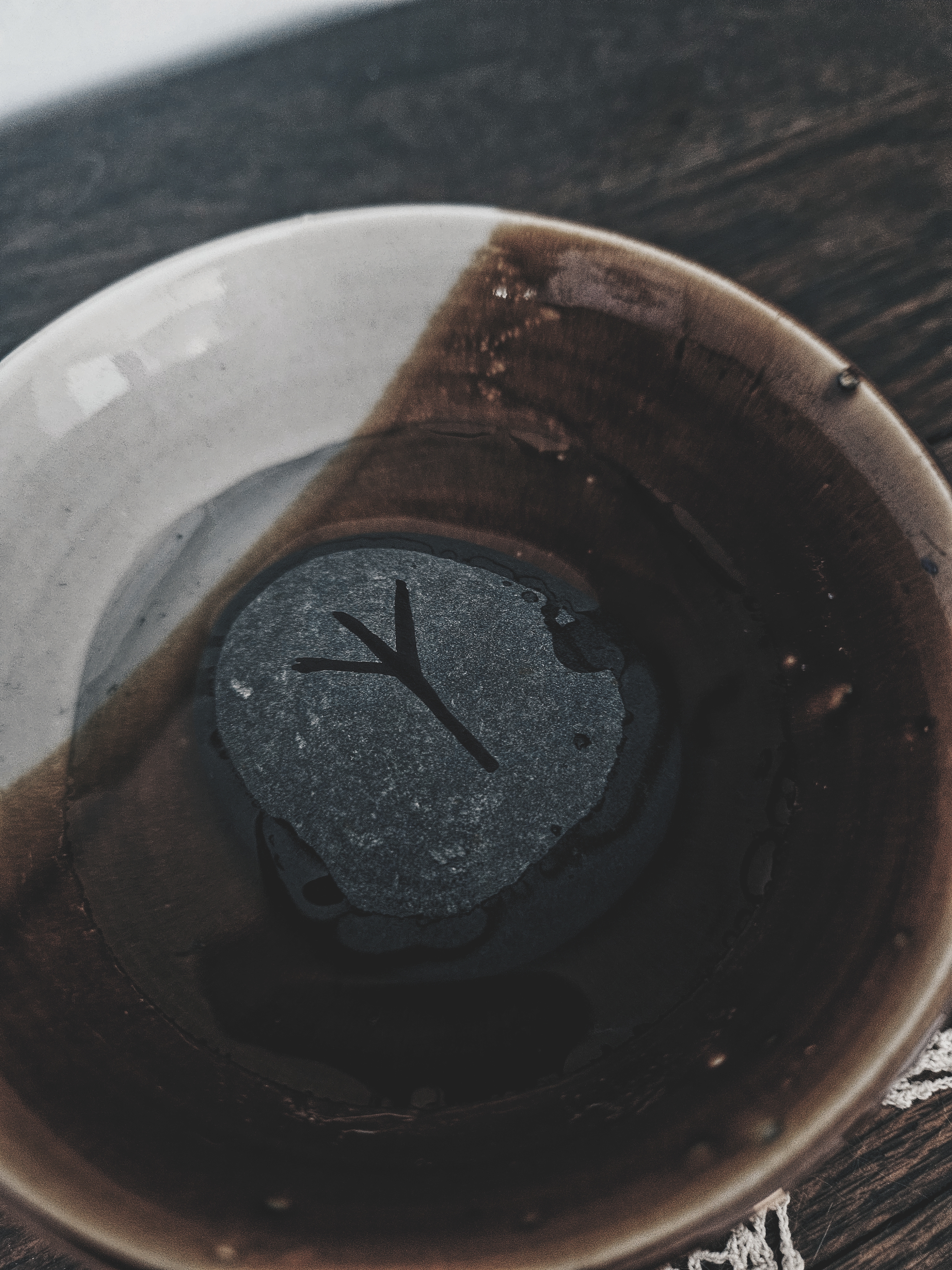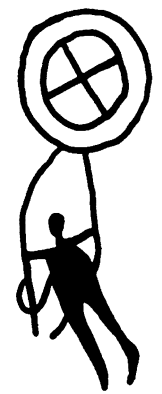Today, we continue our runic study journey by looking at Mannaz (MAHN-nahz), the Humanity rune. While this rune appears much later in the runic poems, I felt it important to cover it now, considering all that is happening in the world. Mannaz (ᛗ) is associated with collective effort, humanity, and connectivity, which is critical in times of crisis.
As seen in my previous runic guides, today's post will include a deep dive into the runic poems, Isa's cultural significance, its correspondences, how to work with it, its meaning in a spread, and its relationships with runes. Also included is a free printable for your Book of Shadows or Grimoire!
Mannaz's Portrayal in the Rune Poems
Mannaz ᛗ is the fourth rune in the final ætt, which belongs to Tyr. This ætt is characterized by justice, courage, heroic glory, and balance. Mannaz encompasses Tyr's spirit of justice and balance by reminding us that we must form and keep community with each other. Like Jera and Isa, Mannaz appears in all three runic poems, suggesting similar cultural meanings across the continent.
Icelandic Rune Poem Translation:
Maðr er manns gaman Maðr, delight of man
ok moldar auki and augmentation of the earth
ok skipa skreytir. and adorner of ships.
homo mildingr.
Anglo-Saxon Rune Poem Translation:
Man byþ on myrgþe his magan leof: The joyous man is dear to his kinsmen;
sceal þeah anra gehwylc oðrum swican, yet every man is doomed to fail his fellow,
forðum drihten wyle dome sine since the Lord by his decree will commit
þæt earme flæsc eorþan betæcan. the vile carrion to the earth.
Norwegian Rune Poem Translation:
Maðr er moldar auki; Man is an augmentation of the dust;
mikil er græip á hauki. great is the claw of the hawk.
From each of these three poems, a pattern emerges. First and foremost, Mannaz ᛗ is referred to as "Man" which, in more modern times, has been referred to as 'humanity.' This is where Mannaz gets its modern English name "Man." However, it is more than just a reference to humanity and mankind. The Anglo-Saxon rune poem in particular hints at Mannaz's deeper meaning of community, collective effort, and connectivity. "The joyous man is dear to his kinsmen" suggests that we are each an integral part of our families and communities, but we will all eventually "fail his fellow" through death, which is divinely ordained.
This allusion to community is further supported in the Icelandic and Norwegian rune poems, which offer a more positive perspective on man's condition. Both poems highlight man's role as an augmentation of the earth or "dust," suggesting we are not only part of this world, but made from it. Our connection to the Earth and all her creatures is within us, part of us. The Icelandic rune poem further suggests that not only are we made of earth, but humans are also the "adorner of ships." This focuses on the positive aspects of human interaction and our accomplishments. We are able to contribute to the greater good of our community and create beautiful things when we work together. The Norwegian rune poem supports this potential for great achievement in the final line "great is the claw of the hawk."
In Norse mythology and folklore, the hawk is associated with wisdom, observation, and knowledge. Veðrfölnir, a hawk, is often depicted perched on Yggdrasil, the world tree, between the eyes of an eagle. Its position symbolizes his role as a messenger and scout, thus associating the hawk with wisdom and insight. The reference to the hawk in the Norwegian rune poem likely represents human ingenuity, especially when working together, just as the hawk works with the eagle.
Needless to say, all three poems reference our interconnectedness to each other, importance in our community, potential or destiny to do great things, but also our eventual death.
Apart from the rune poems, we can also look at the composition of the Mannaz rune itself. Mannaz consisted of a double Wunjo rune- ᛗ. Wunjo signifies joy, happiness, and fulfillment, a state of harmony within oneself and their relationship with others. Generally, Wunjo is seen as joy and happiness within a family. By putting two Wunjo runes together, Mannaz now represents multiple families or the community. Therefore, Mannaz can be viewed as joy, happiness, and fulfillment within the community or society.
Mannaz's Cultural Significance
Norse culture placed strong emphasis on community and the family, which can be seen through the Eddas, sagas, and archeological evidence. A large family was fundamental, particularly on farms where additional help was needed. An individual's status within the community and their destiny were directly tied to family land ownership. While more land meant higher status, it also required more helping hands to manage it, so it wasn't uncommon for multiple generations to live together in longhouses. These longhouses could house 30 to 50 people and served as multifunctional spaces. Individuals would live, work, and gather within these houses.
Community and social cohesion were strongly valued as families relied on each other for survival. Larger assemblies of families were often known as "things" that were usually ruled by a chieftain. Together with their chieftain, the community would discuss political matters, make laws, and resolve disputes. Strategic marriages were planned, and communal victories were celebrated together. These were held often and played an essential role in maintaining social order while simultaneously strengthening communal bonds. It was an opportunity to display generosity, exchange gifts, and celebrate each other.
As previously mentioned, Things would also decide and pass laws, which were largely oral in nature. As such, enforcement of the laws relied on the community. Failure to follow the laws resulted in ostracization and even exile from the community, which often meant a death sentence, as without the help of your community, it was unlikely you would survive the harsh winters.
 |
| Björketorp Runestone by Joachim Bowin |
While the evidence of Mannaz's cultural significance is scarce in the archeological record, there can be no doubt that it was honored and revered as a key tenant of Norse society.
Mannaz's Correspondences
It should be noted that general correspondences are not mentioned in any Nordic text. Instead, these are a best guess based on experiences from both myself and others. In fact, most of these are of modern invention, pulling inspiration from Wicca. As with all correspondence lists, you can add and subtract based on your experiences.
- Upright Meaning: humankind, humanity, social order, interconnectedness, connection, social harmony, support, assistance, collaboration, community, memory, wisdom
- Reversed Meaning: loneliness, isolation, obstacles, interference from the outside, self-delusion, manipulation, lack of support, disconnected, stagnation
- Letter: M
- Element: Water
- Zodiac: Aquarius
- Planet: Jupiter
- Animal: hawk/goshawk, raven, fox
- Colors: purple, blue, dark red
- Deities: Tyr, Odin, Mimir, Heimdall
- Plants: ash, vine, sage, nutmeg, caraway, ginkgo, lemongrass, rosemary, spearmint
- Crystals: garnet, amethyst, apatite
How to Work with the Mannaz Rune
Incorporating runes into your magical practice can be incredibly rewarding and bring new energies to spells and rituals. But how exactly can you use Mannaz in your workings?
- Meditate on Mannaz to better understand your role within your community and discover your strengths and weaknesses.
- Use in spells or rituals to strengthen existing relationships and build new connections.
- Wear or carry the Mannaz rune to promote friendships, cooperation, and build connections.
- Chant Mannaz to raise energy to connect with your higher self or connect with divinity, especially Mimir, Odin, Tyr, or Heimdall.
- Sleep with Mannaz under your pillow to invite dreams that offer guidance on your purpose, relationships, and identity.
- To promote harmony and mutual respect, write the names of the people you wish to build community with on a piece of paper and draw the Mannaz rune over all of them.
- Draw the Mannaz rune in anointing oil, chalk, or smoke in a community space to promote harmony and collaboration.
- Include the symbol of Mannaz (ᛗ) in collaborative assignments, projects, or documents to ensure a harmonious collaboration. You can draw or type the rune into the document in white so it goes unnoticed.
- Draw the Mannaz rune on packaging or storage of donated food and resources to bless them as acts of solidarity.
- Incorporate the Mannaz rune into signs, banners, and murals used in activism and protest art.
- Use in spells and rituals for community protection, collaboration, harmony, and interconnectedness.
- Draw on a candle while praying for protection and justice for marginalized communities.
- Use in spells and rituals to elevate marginalized voices.
- Include on mutual aid altars or other community altars to bring balance and harmony.
Mannaz's Meaning in Rune Spread
Below are some examples of how to interpret Mannaz when it's next to or near other runes:
- Next to Wunjo or Gebo suggests that working with others and leveraging collective strength will be beneficial.
- In proximity to Isa suggests isolation, stagnation, and a need to re-evaluate your path and motivation.
- Near Dagaz suggests a relationship with a strong foundation built on mutual support.
- If Mannaz is reversed near Nauthiz, it indicates waiting until decisions are made.
- In combination with Sowilo suggests future success for your community and yourself.
- If Mannaz is reversed and found in proximity to Tiwaz or Uruz, it is likely not a good time to show aggression or assertiveness, and instead, take a step back and approach the situation with empathy and understanding.
- Paired with Kenaz suggests personal enlightenment
Mannaz's Relationships with Other Runes
Mannaz, when upright, embodies the concepts of social harmony and personal integrity, while also representing humanity as a collective force. In relation to other runes, Mannaz represents either our relationships or our inner self, and its meaning is influenced by the runes around it. It does not directly oppose or support other runes but instead offers further insight into the meaning of the runes around it.
Reversed, however, Mannaz embodies manipulation and isolation, that you or your community is disconnected from each other. Its full meaning in the reverse position is supported by the runes around it.
***
Mannaz invites us to remember that we are a small part in a larger picture and that our role in society is important. We are greater together. Below you will find a printable, cheat sheet that includes a summary of all important information that you can incorporate into your Book of Shadows or Grimoire.
Click the image below to download your free cheat sheet for your Book of Shadows or Grimoire.
If you liked this post, please consider leaving a small tip in the jar.









.png)







